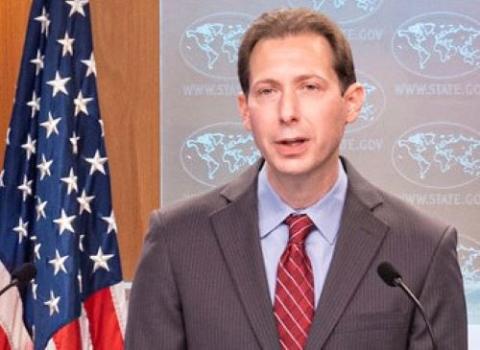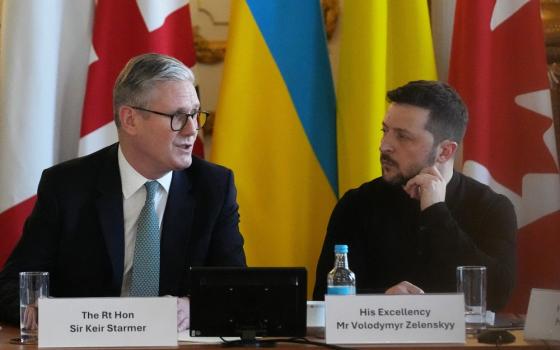Russian President Vladimir Putin and Russian Orthodox Patriarch Kirill of Moscow visit an exhibition in Moscow in this Nov. 4, 2019, file photo. Vatican officials have appealed to Kirill to intervene and ask Russian President Vladimir Putin to end the war in Ukraine. (CNS/Reuters/Shamil Zhumatov)
The U.S. government believes the Vatican is an important voice in calling for an end to Russia's war against Ukraine and is "closely following" Pope Francis' repeated denouncements of the conflict, according to a State Department official.
"His very forceful denunciation of war yesterday was incredibly notable," said Daniel Nadel, director of the Office of International Religious Freedom, referring to Pope Francis' remarks during his March 6 Sunday Angelus.
The pope — in his most extensive comments to date about the Russian invasion — reiterated that the Vatican was willing to serve in any capacity to broker a peace deal. His remarks followed an offer from the Vatican secretary of state, Cardinal Pietro Parolin, that the Vatican would be willing to negotiate a mediation between Ukraine and Russia.
Some experts, however, have cast doubt on whether the Roman Catholic Church could be viewed by Russia as a neutral negotiation given its complicated relationship with Russia's Orthodox Church, which split from the Catholic Church over a millennium ago and has strong backing from the Russian government.

Daniel Nadel, director of the U.S. Office of International Religious Freedom, delivers remarks on the 2020 International Religious Freedom Report in this May 12, 2021, file photo. He recently met with Vatican leaders and said he expects Pope Francis to continue publicly denouncing Russia's attacks on Ukraine. (Flickr/State Department/Freddie Everett)
Even so, Nadel says he believes the Holy See's voice remains crucial.
"I have every confidence that the Vatican is deeply engaged on the war in Ukraine, and I anticipate it will continue to speak out forcefully," he told NCR March 7.
Nadel met in recent days with his counterparts inside the Vatican, marking his first visit from the Biden administration's Office of International Religious Freedom, a U.S. State Department office established in 1998 to promote freedom of religion as a core objective of U.S. foreign policy.
While Nadel said that some critics expressed doubt that the Biden administration would continue to prioritize religious freedom, he said he hopes his visit shows that "the efforts to promote religious freedom for all remain a broad bipartisan effort and remain fully by this administration."
And he sees the Vatican as a partner in that endeavor.
"I think there really is a shared perspective," Nadel said, saying both the Vatican and the United States speak frequently about the importance of human dignity. In some situations, he said, the United States is the "perfect voice" to address a violation of religious freedom. Sometimes other governments may be more effective or better placed.
"A lot of times it's a question of how do we coordinate what we're collectively interested in doing to try and maximize the results?" Nadel said. "One of the dramatic strengths of the Vatican is that they are everywhere, and they're talking with everybody."
Nadel said he was leaving Rome with a "renewed vigor" to address religious persecution and discrimination, which both the Holy See and the White House pledged to work together on following U.S. President Joe Biden's October 2021 visit to the Vatican.
During that visit, as he does during all meetings with world leaders, the pope gave Biden a copy of the Document on Human Fraternity, a landmark document signed by Francis and Ahmad el-Tayeb, the grand imam of Al-Azha. The document is widely considered a major advancement in the Catholic Church's relationship with the Muslim world and calls for pluralism and religious freedom.
Nadel said that documents like this, along with Pope Francis' 2021 encyclical Fratelli Tutti, help set the stage for governments and world leaders to have better discourse in working toward specific, shared policy goals.
Advertisement
While the United States and the Vatican have many overlapping goals and policy aims, one source of tension in recent years has been the Holy See's policy toward China.
In 2020, U.S. Secretary of State Mike Pompeo traveled to Rome to push Vatican diplomats to take a harder line in its policies toward China. The Holy See, however, has sought to make inroads in Beijing, with whom it does not have formal diplomatic relations.
In 2018, the two governments signed a historic agreement over the appointment of Catholic bishops in the communist country — a deal that the Vatican renewed in 2020, despite U.S. criticism that the Vatican was not sufficiently condemning China's human rights abuses.
While Nadel declined to discuss specifics of his conversations with Vatican officials, he said China's record on religious freedom and human rights remains a major concern of the U.S. government and that he reiterated that position in his talks with the Holy See.
"From the U.S. perspective, there continues to be tremendous abuse and persecution taking place against individuals in China on account of their religion or beliefs," Nadel said. "That includes continued discrimination, harassment and abuse and jailing of members of the Catholic community, including the underground Catholic Church, so unfortunately, things are really tough there for religious adherents of all types, including Catholics."
Nadel, a non-political appointee who has served in his role since 2015, said that with the United States, China or anywhere in the world, religious freedom is a winning proposal and he welcomes continued partnership with the Vatican to push that message.
"Governments that effectively respect the rights of people to organize their lives in accordance with their conscience," he said, "are more secure and more stable or more economically vibrant than those that don't."





